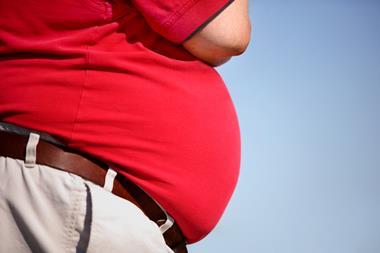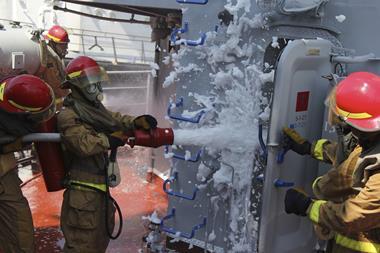Toxicologists are expressing concern that exposure to per- or poly-fluorinated substances (PFASs) can increase a person’s likelihood of developing severe Covid-19. There are also warning that PFASs could also diminish the effectiveness of a vaccine against the novel coronavirus.
A number of studies in the scientific literature have now linked elevated PFAS levels with immune system suppression, as well as decreased response to vaccines. Philippe Grandjean, an adjunct environmental health professor at Harvard University, and colleagues have found that higher levels of the PFAS perfluorobutanoic acid (PFBA) in the blood are associated with increased severity of Covid-19 infections.
PFBA, a breakdown product of other PFAS chemicals, is known to accumulate in the lungs more than any other compounds in its class. It is a short four carbon PFAS with a half-life of three to four days, compared with two to three years for long-chain PFASs like perfluorooctanoic acid (PFOA) and perfluorooctanesulfonic acid (PFOS).
Grandjean’s team analysed blood samples from 323 Covid-19 patients in Denmark, and found that those with high PFBA serum levels were more than twice as likely to develop a severe form of the disease. Overall, patients with elevated PFBA had a higher chance of being hospitalised, entering intensive care and dying than those with lower levels.
The researchers measured five PFAS compounds in these patients’ serum, but the other four were not associated with more serious cases of Covid-19.
PFAS chemicals are immunotoxic and therefore can ‘very likely interfere with the Covid-19 infection’, Grandjean says. He suggests that the low background exposures in Denmark may have prevented his research team from seeing the effects of PFASs other than PFBA.
‘I am not surprised that we are finding these effects related to Covid-19 susceptibility, as exposure to other PFAS compounds is associated with many other negative health effects,’ says Will Dichtel, an organic chemist who studies PFAS at Northwestern University in Illinois. It is possible that PFAS compounds beyond PFBA will cause similar effects, or that there might be antagonistic effects from being exposed to mixtures of different PFASs, Dichtel suggests. ‘The authors chose to study PFBA here because it has been previously shown to accumulate in lung tissue,’ he adds, pointing out that other PFAS compounds also accumulate partially in the lungs but also go to other tissues.
Several PFASs are known to dampen the immune system response to foreign proteins in various vaccines, such as the tetanus one, Grandjean notes. ‘So I suspect that people with elevated PFAS exposure (not just PFBA) may have a deficient response to the foreign protein,’ he adds.
CDC investigates
The US Centers for Disease Control and Prevention (CDC) is currently investigating whether there is an association between levels of PFAS in the blood and the risk of coronavirus infection. It is also looking at whether there is a connection between PFAS levels and antibody response that might affect vaccination against Covid-19.
The number of chemicals in the PFAS class is growing rapidly, with current estimates at over 9000. These compounds are water- and grease-repellent, as well as heat-resistant, and are therefore used in a wide variety of products like non-stick cookware, waterproof clothing, food packaging and firefighting foams.
Because PFASs contain carbon–fluorine bonds, which are among the strongest single bonds, they are also persistent. These compounds, which are a major contaminant in drinking water and groundwater worldwide, are linked to not only immune system problems, but also other health issues that increase a person’s risk of severe Covid-19 such as obesity, type 2 diabetes and certain types of cancer.
During an online press event hosted by the Environmental Working Group on 17 December, experts like Linda Birnbaum, a toxicologist and microbiologist who formerly headed the US National Institute of Environmental Health Sciences and the National Toxicology Program, discussed how communities that are exposed to high levels of PFAS chemicals may be more vulnerable during the pandemic. ‘We know that suppression of the immune system can be associated with a decreased ability to mount a therapeutic response to vaccination,’ Birnbaum said. ‘That doesn’t mean you don’t get any response to vaccination, you may just not get as much.’ She suggested that there may be opportunities for those living in areas with elevated PFAS contamination, or working jobs that result in significant PFAS exposure such as firefighters and military personnel, to be prioritised when it comes to receiving a Covid-19 vaccine or even an extra booster.
‘People with higher levels of PFAS in their blood are at increased risk of immunotoxicity and this may increase the risk of a more severe Covid reaction and, as Dr Grandjean and his colleagues reported, it may also increase the risk of a reduced response to the Covid-19 vaccine,’ said Jamie DeWitt, associate professor of pharmacology and toxicology at East Carolina University, US, at the press event. ‘Dr Grandjean’s study demonstrated that there was an increased severity from exposure to PFBA, or levels of PFBA in people’s serum. I think that the risk is real, but we can’t put definitive numbers on those risks right now.’
Grandjean agrees with Birnbaum’s analysis. ‘In the past, when we saw that children had antibody levels that were below the level of protection, we just gave the child another booster vaccination,’ he tells Chemistry World. ‘I would think that this option needs to be considered also for the corona vaccines, but I would first like to see data on corona antibody levels in people with different levels of PFAS exposure.’

















1 Reader's comment